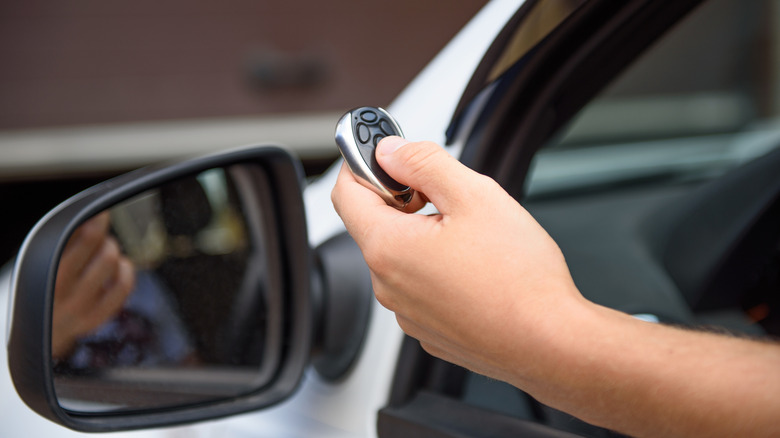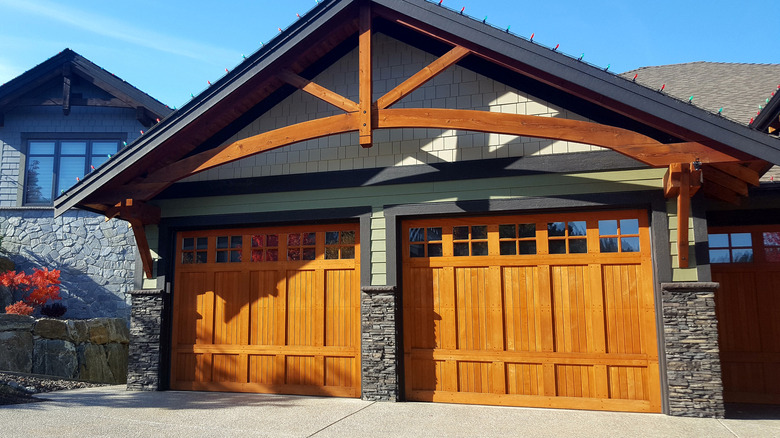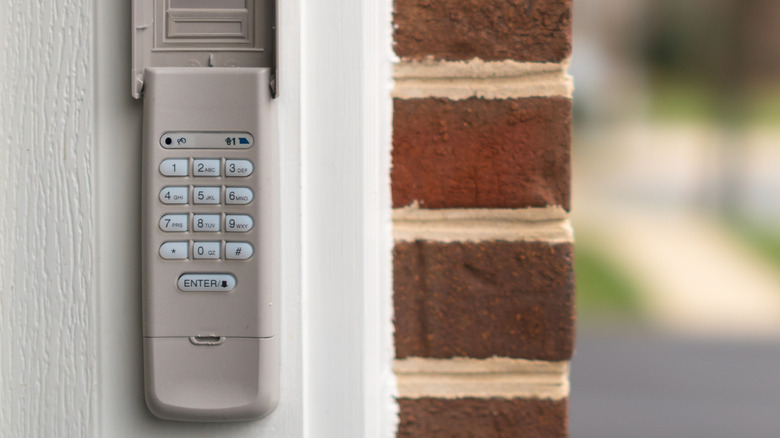How To Determine The Best Horsepower For Your Garage Door Opener
Leave it to Americans to rate not only the cars in their garages by horsepower, but also the motor that opens the garage door. And it's actually not uncommon; a number of household motors are rated by hp, from spas to washing machines to a variety of water pumps. The only problem is that we often don't really understand what these ratings mean, so when it's time to shop for something like a garage door opener, it can be difficult to choose one with the right amount of power.
House Digest spoke exclusively with Jason Cessna, president of Door Dorks, to find out what this door horsepower thing is all about. He gave us some straightforward advice that reveals the importance of the hp rating, and of making the right purchasing decision. "When choosing a new garage door opener," Cessna said, "it is very important to consider the opener's horsepower rating to ensure it has enough lifting power for the type of garage door you have." For most of us, owners of what Cessna calls "residential overhead sectional garage doors," openers are rated anywhere from ⅓ hp to 1 ¼ hp. (He also noted that openers with DC motors, instead of the more common AC motors, are often designated by Newton force, but tend to list an equivalent horsepower rating, too.)
Which horsepower rating suits your garage door?
Fortunately, it's not difficult to figure out which hp rating you need in a garage door opener. When House Digest spoke exclusively with Cessna, he said that it's mostly a matter of knowing what the door is made of, what type of insulation it has (if any), and looking up the weight of the door. "Garage doors vary in weight — depending on size, materials and insulation value," he explained. "The heavier the door, the higher the horsepower you will need to make sure your opener performs its job correctly and for a long time." An opener's weight limit is usually listed in its product specs, though you might occasionally have to dig around for it. Your door's weight can usually be found in the manufacturer's spec sheet. Some modern garage door designs, like those using lots of glass or wood, can require a heftier door opener motor.
Insulation is often heavier than it looks, as anyone who's lugged around enough rolls of insulation can tell you. Note both the type of insulation (fiberglass, mineral wool, etc.) and the insulation's R-value, which should tell you its thickness and, therefore, how heavy it's likely to be. "If you have a single-car non-insulated garage door made from aluminum or steel, ⅓ hp to ½ hp motors are fine," Cessna said. "Once you go up in size to a two-car garage door (especially with insulation), you generally want to consider a ¾ hp." Wood garage doors, or those that are particularly well-insulated, will generally require at least a 1 hp door opener.
Other considerations when shopping for a garage door opener
As is the way of modern product complexification, garage door openers don't stop at merely opening doors. But, unlike features tacked onto computer software and dishwashers, the additional capabilities of garage door openers — often related to convenience, security, and safety — usually make a lot of sense. When House Digest spoke exclusively Cessna, he explained that horsepower is important, but the added features can be, too. "When considering a new opener, you want to get something that is going to be strong enough to open your garage door effectively and consistently," he said. But don't neglect lighting, security capabilities, and mobile and smart home integration. "Today's models are available with a variety of features such as smart-phone technology, cameras, [and] enhanced LED lighting," he said.
There are a lot of other factors to consider as well when choosing a door opener, Cessna told us. How often will you open and close the garage door? Is quiet operation — a feature of belt-drive openers — important to you? Do you need a battery backup system in case of power failures? And don't forget the warranty. Choosing this seemingly simple device can be a bit overwhelming. And while you can sometimes install your own garage door opener, you don't have to — considering the range of costs to install a garage door opener, it might not be worth your time. "It's always a good idea to consult with a professional and reputable garage door company to go over options in detail and ensure that you get an opener that works for your situation," Cessna said.


